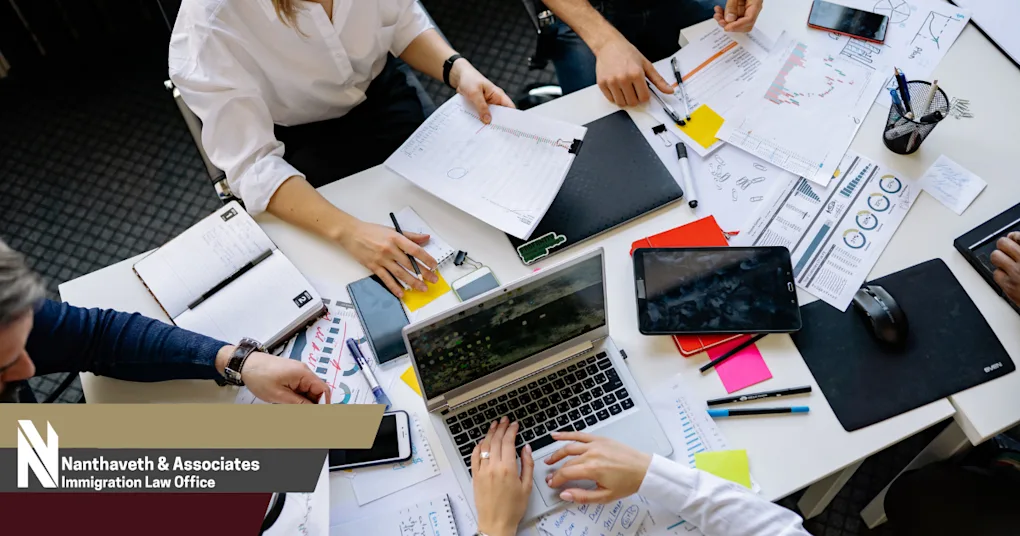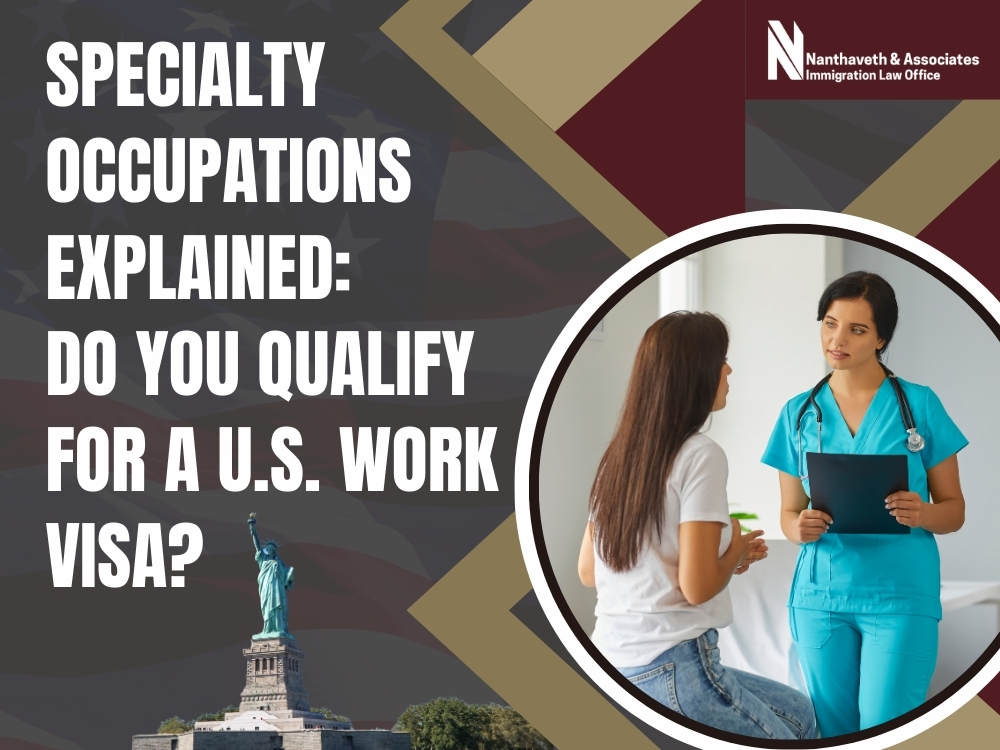Everything You Need to Know About an H-1B Visa

The H-1B visa, which is a nonimmigrant classification, allows employers in the United States to temporarily hire qualified foreign workers—who aren’t otherwise permitted to work in the country—in order to obtain services and skills they are currently unable to glean from the workforce in the U.S. This includes work within specialty occupations, services of exceptional merit and ability pertaining to U.S. Department of Defense (DOD) research and development, and the services of noteworthy fashion models.
What Qualifies as a Specialty Occupation?
Specialty occupations are ones that require the use of highly specialized knowledge, and a bachelor’s degree or higher. Such occupations can include:
- Doctors and surgeons
- Researchers
- Financial analysts
- Accountants
- Graphic designers

Who is Eligible for an H-1B Visa for Specialty Occupations?
To be eligible for an H-1B visa for specialty occupations, you must meet certain educational and professional standards, which include satisfying one of these requirements:
- Possessing a foreign degree from an accredited university or college, which is comparable to a U.S. bachelor’s degree (or a higher degree), and is required by your specialty occupation
- Having specialized training or progressive experience that is comparable to a U.S. bachelor’s degree (or a higher degree) in your specialty occupation, and being a recognized expert in your specialty
How Can You Apply for an H-1B Visa?
You can’t apply for an H-1B visa for yourself. Your prospective employer must do so for you by filing Form I-129 with United States Citizenship and Immigration Services (USCIS). But before they file this form they must obtain a certified Labor Condition Application.
Helpful Business Immigration Links
What is a Labor Condition Application?
A Labor Condition Application (LCA) is a document in which employers and agents attest that they will maintain equity between H-1B workers and similarly employed U.S. workers, both in pay and within the workplace. Employers and agents of H-1B workers must complete an LCA and have it certified by the U.S. Department of Labor (which refers to LCAs as ETA 9035). An LCA mandates that an employer or agent adhere to these labor requirements:

- Paying H-1B workers a wage that is not less than the pay of similarly qualified workers. If the wage is higher, it should be consistent with the prevailing wage for the job within the geographic area where the H-1B worker will be employed
- Employers and agents of H-1B workers will foster working conditions that will not negatively impact similarly employed workers
- Confirming that there was no strike or lockout at the workplace at the time the LCA was filed
- Ensuring that a union bargaining representative was given notice that an LCA was filed with the DOL, or that the information was posted in the workplace
If an employer violates these conditions, they may be fined, barred from sponsoring nonimmigrant or immigrant workers, or levied with other sanctions.
If you’re a prospective employer who finds these details to be a bit confusing, don’t worry. It’s wise to take a moment to reach out to an immigration attorney. A skilled attorney can clarify the implications of an LCA for you and ensure that your document is properly completed and submitted to the Department of Labor, since certification of an LCA is at the core of the H-1B process.
How Does an Employer Apply for an H-1B Visa With USCIS?
After the Department of Labor certifies an employer’s LCA, the employer should complete USCIS Form I-129, Petition for a Nonimmigrant Worker (briefly mentioned earlier). The petition and the certified LCA should be sent together to USCIS—including the following documentation and evidence, which applies to a specialty occupation worker:
- Evidence that the employment offered qualifies as a specialty profession
- Evidence demonstrating that the prospective H-1B worker is qualified to work in the specialty profession
- A copy of a written contract of the terms of employment between the employer and potential H-1B worker, or a summary of an oral agreement by which the worker will be employed
What Required Evidence Does an Employer or Agent Need to Submit to USCIS in Order to Apply for an H-1B Visa for a U.S. DoD Research and Development Project Worker, and a Fashion Model of Merit?
Required Evidence for a U.S. DoD Research and Development Project Worker (H-1B2)
It’s important to note that an employer does not need to submit a certified LCA to USCIS for a potential DoD project worker. Evidence that should be submitted to USCIS regarding a prospective H-1B2 DoD project worker includes:
- A job description
- A statement that lists the names of noncitizens currently employed on the project, or who have been employed on the project, in the past year—as well as their dates of employment
- Proof that the prospective H-1B2 worker has a bachelor's degree, an equivalent, or a higher degree, in their field
- A letter of verification from the DoD project manager
Required Evidence for a Fashion Model of Distinguished Merit (H-1B3)
Evidence that should be submitted to USCIS regarding an H-1B3 fashion model of merit includes:
- Evidence demonstrating that the individual is a fashion model of merit and ability
- Evidence showing that the individual will perform at events and productions that are highly reputable
- Copies of a written contract between the agent and individual, or a summary of an oral agreement by which the individual will be employed
What is Your Responsibility in the H-1B Visa Process?
After Form I-129 filed on your behalf is approved by U.S. Citizenship and Immigration Services, you will need to apply for a visa with the U.S. State Department at a U.S. embassy or a consulate in your home country. To obtain a visa, you’ll need to show that:
- You have an approved H-1B petition from your employer
- You have a valid passport
- You have sufficient money to sustain yourself while you’re in the U.S.
- You’re healthy, and have received all vaccinations required
- You don’t plan to immigrate to the U.S. permanently (show proof of a continued connection to your country of origin—family, assets, etc.)
- You’re not inadmissible to the U.S.
Once you’re approved for an H-1B visa, you’ll need to apply for admission to the U.S. in an H-1B classification with U.S. Customs and Border Protection (CBP). Then, you can begin working for your U.S. employer.
How Long Can You Stay in the U.S. on an H-1B Visa?
An H-1B visa allows you admission to the U.S. for up to three years. You may be able to extend your time in the country, but the period of stay is usually limited to a total of six years—some exceptions can be made, however. Your immigration attorney will be able to explain this to you.
Frequently Asked Questions
What is a B-1 Visa?
A B-1 Temporary Business Visitor Visa is for individuals planning to participate in business activities inside the United States. Some included activities include contract negotiations, business consultations or conferences set for specific dates. To be eligible, you must meet the following requirements:
- The purpose your trip must be for a activities dealing with a legitimate business
- You plan on staying for a limited period of time
- You have the funds necessary to cover the expenses involved in your trip to the United States
- You have a residence outside of the United States, and you do not plan on abandoning that residence
- You are otherwise admissible to the United States
What is an H-1B visa?
An H-1B Visa allows corporations to sponsor immigrant workers who possess a bachelor’s degree or higher in an area of study related to the business of the company. It is a nonimmigrant visa.
Are there immigrant visas available for permanent employment in the U.S?
Yes. There are Permanent Worker Visas available in five different preference categories - EB-1, EB-2, EB-3, EB-4, and EB-5. The categories differ based on different skills, areas of study, and professions required for eligibility. EB-2 and EB-3 applicants are also required to obtain a Labor Certification from the U.S Department of Labor.
Do You Need to Talk to an Attorney About Obtaining an H-1B Visa?
If you’re interested in getting an H-1B visa for a prospective worker, we may be able to help you. Call our office today to schedule a consultation to speak with an experienced Austin immigration attorney who can provide the legal guidance you need.


11211 Taylor Draper Lane Suite 107
Austin, TX 78759
Tel: (512) 828-3791
Hours: 8:00 AM - 6:00 PM
Payment: all major credit cards, cash, check, money orders, cashiers check
Directions To Our Office
Areas Of Service
Copyright © 2025 | Nanthaveth & Associates | Immigration Law Firm Marketing Specialist MarketCrest
Not all consultations are free, and they are not all conducted by Vi Nanthaveth.
